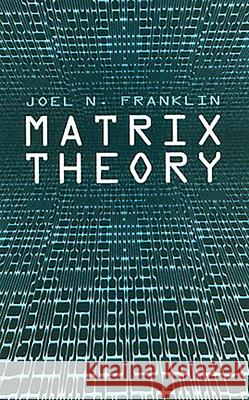Matrix Theory » książka
Matrix Theory
ISBN-13: 9780486411798 / Angielski / Miękka / 2000 / 292 str.
Not only is matrix theory significant in a wide range of fields mathematical economics, quantum physics, geophysics, electrical network synthesis, crystallography, and structural engineering, among others-but with the vast proliferation of digital computers, knowledge of matrix theory is a must for every modern engineer, mathematician, and scientist. Matrices represent linear transformations from a finiteset of numbers to another finite set of numbers.
Since many important problems are linear, and since digital computers with finite memory manipulate only finite sets of numbers, the solution of linear problems by digital computers usually involves matrices. Developed from the author's course on matrix theory at the California
Institute of Technology, the book begins with a concise presentation of the theory of determinants, continues with a discussion of classical linear algebra, and an optional chapter on the use of matrices to solve systems of linear triangularizations of Hermitian and nonHermitian matrices, as well as a chapter presenting a proof of the difficult and important matrix theory of Jordan. The book concludes with discussions of variational principles and perturbation theory of matrices, matrix numerical analysis, and an introduction to the subject of linear computations.
The book is designed to meet many different needs, and because it is mathematically rigorous, it may be used by students of pure and applied mathematics. Since it is oriented towards applications, it is valuable to students of engineering, science, and the social sciences. And because it contains the basic preparation in matrix theory required for numerical analysis, it can be used by students whose main interest is computers. The book assumes very little mathematical preparation, and except for the single section on the continuous dependence of eigenvalues on matrices, a knowledge of elementary algebra and calculus is sufficient.











